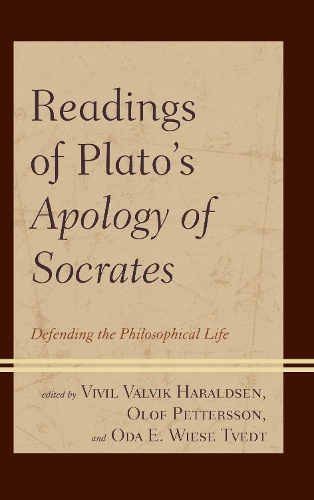
Readings of Plato's Apology of Socrates: Defending the Philosophical Life
(Hardback)
Available Formats
Publishing Details
Readings of Plato's Apology of Socrates: Defending the Philosophical Life
By (Author) Vivil Valvik Haraldsen
Edited by Olof Pettersson
Contributions by Olof Pettersson
Edited by Oda E. Wiese Tvedt
Contributions by Arlene Saxonhouse
Contributions by Oda E. Wiese Tvedt
Contributions by Kristin Sampson
Contributions by Knut gotnes
Contributions by Jacob Howland
Contributions by Gro Rrstadbotten
Bloomsbury Publishing PLC
Lexington Books
28th December 2017
United States
Classifications
Professional and Scholarly
Non Fiction
Politics and government
Ancient Greek and Roman philosophy
Ancient history
Social and political philosophy
184
Physical Properties
Hardback
256
Width 159mm, Height 237mm, Spine 24mm
567g
Description
In Platos Apology of Socrates we see a philosopher in collision with his societya society he nonetheless claims to have benefited through his philosophic activity. It has often been asked why democratic Athens condemned a philosopher of Socrates' character to death. This anthology examines the contribution made by Platos Apology of Socrates to our understanding of the character of Socrates as well as of the conception of philosophy Plato attributes to him. The 11 chapters offer complementary readings of the Apology, which through their different approaches demonstrate the richness of this Platonic work as well as the various layers that can be discerned in its presentation of Socrates. While the contributions display variety in both topics and angles, they also share common features: An awareness of the importance of the literary aspects of Platos courtroom drama, as well as a readiness to take into consideration the historical context of the work. Thereby they provide contributions to a manifold understanding of the aims and impact of the work, without losing sight of the philosophical questions that are raised by Socrates confrontational and unrepentant defense speech. Allowing the character of Socrates to take center stage, the chapters of this volume examine the philosopher in relation to ethics, and to politics and democracy, as well as to the ideology, religion, and virtue shared by the Athenians. Readers will also find reflections on classical Platonic subjects such as the nature of Socratic philosophical inquiry and of philosophy itself, as well as on the notoriously ambiguous relationships between philosophy, sophistry and rhetoric, and their several relationships to truth and justice. The anthology emphasizes and explores the equivocal and sometimes problematic aspects of Socrates as Plato presents him in the Apology, illuminating why the Athenians let the verdict fall as they did, while drawing out problematic features of Athenian society and its reaction to Socrates philosophic activity, thereby encouraging reflection on the role philosophy can play in our modern societies.
Reviews
Undergraduates frequently encounter Plato through the Apology. But how does one move from impressions of this exceptional dialogue to philosophical and historical scholarship This fine anthology, from a 2015 conference in Bergen, Norway, supplies this pedagogical need. The 11 essays survey cruxes of the dialogue that Gro Rrstadbotten (in his essay "Socrates's Telling of the Truth") calls the "point zero," where Plato's Socrates meets his historical counterpart. Most essays problematize Socrates himself. Arlene Saxonhouse sees tensions between democracy and "shameless" speech (parrhesia). Other contributors link Socrates's rhetoric to history. Rrstadbotten reviews the amnesty law that prohibited litigious reference to the atrocities of the oligarchy. Hallvard Fossheim faults Socrates regarding Aristotles account of virtueSocrates's cleverness, poverty, and lack of straightforward political engagement compromise practical wisdom. The eminent Paul Woodruff argues that Socrates's exhortation to Athens is strange unless understood as a call to jurors "to examine themselves and live in accordance with human limitations." Such insights supplement those in previous works on either the broader philosophy of Socrates (e.g., Thomas Brickhouse and Nicholas Smith's The Philosophy of Socrates, CH, Jul'00, 37-6200) or on his rhetoric (I. F. Stone's The Trial of Socrates, CH, Nov'88, 26-1493). Summing Up: Recommended. Lower-division undergraduates through faculty. * CHOICE *
Author Bio
Vivil Valvik Haraldsen is lecturer at the University of Bergen. Olof Pettersson is research fellow at Uppsala University. Oda E. W. Tvedt researches history of philosophy at Uppsala University.
